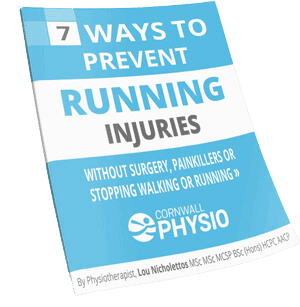If you’ve suffered with Running Pains you have probably heard a wild range of stories and opinions from friends and family, and even outdated advice from doctors to rest and rely on painkillers which has left you confused, frustrated and unable to get long-term relief.
Here are some of the most common running pain myths people who visit our Cornwall clinic have been told which has actually made their running pain much worse, and stopped them living the life they deserve.
MYTH #1 - REST IS THE ONLY SOLUTION
The biggest myth around running injuries is the belief that rest is the only solution. For some injuries and conditions, rest can actually make the problem worse or fail to address the underlying cause. Instead, it’s crucial to find the root cause.
Many running injuries are not solely caused by overuse or excessive activity but can stem from imbalances, muscle weaknesses, or faulty movement patterns. Rest may only provide temporary relief and the injury will immediately return once activity is resumed. Also, prolonged rest can lead to loss of cardiovascular fitness and decreased bone density, which can in turn lead to further injury when training is resumed.
Many running injuries are due to a lack of strength, a concern that certainly doesn’t improve when training stops. At Cornwall Physio, the root cause is addressed through targeted strengthening exercises and appropriate training modifications.
MYTH #2 - IF YOU GET INJURED, IT'S BEACUSE YOUR WEARING THE WRONG SHOES
Another major misconception is about running shoes. People often think they must be in the wrong shoes when they get injured. However, the science does not support the idea of a universally right or wrong shoe. Running injuries are more related to the amount of running done, doing too much relative to the body’s ability to cope at a given time, and how activities are performed. The belief that shoes are the main culprit is a common myth. To address running injuries, it’s important to consider various factors, including how you are moving, your training regimen, your body’s condition, and your general health. By piecing together these elements, it’s possible to get runners back to exercising at the best time and help them perform at their best once they return.
MYTH #3 - ONLY EXPERIENCED RUNNERS CAN GET INJURED
Another prevalent myth about injuries obtained through running is the belief that only inexperienced runners are susceptible to them. This suggests that, as runners become more experienced and seasoned, they become immune to muscle injuries. However, this is not the case.
In reality, injuries can affect runners of all levels, from beginners to elite athletes. While experienced runners may have a lower risk of certain types of injuries due to conditioning, they can be prone to other injuries caused by pushing through discomfort or ignoring warning signs of potential injury, believing this resilience will improve their athletic performance.
At Cornwall Physio, runners from every background and ability are seen, so the assertion that only beginners, inexperienced, or older runners are prone to injury is completely unfounded.
Previous slide
Next slide
Are You Upset, Unsure or Even confused About these myths that people you trusted have told you - Which have probably led to more running pain?
I know how upsetting it can be when you don’t know why you’re in pain, or struggling to move freely – and my expert team would love to help you get some clarity in a quick, free telephone call.
Simply click the button below, and arrange a free telephone consultation with our expert team who can answer your questions, listen to your story, and end your uncertainty, confusion and frustration.
Get Your Free Copy Of This Report, Written by Cornwall's Leading Running Pain Expert, Lou Nicholettos
Simply Complete The Short Form and We’ll Email You Your FREE REPORT

Want Help To Decide If Physiotherapy Is Right For You?
Enquire About Cost And Availability
If you’d like to speak with a Physio before you arrange an appointment or if you have questions about our services why not arrange a call back with one of our Physiotherapists?
Request A Call Back
If you’re not quite ready to book an appointment yet and have some questions you would like answered first, click the link below to complete the form.
